Who will police Surrey? It’s been more than four years since that question figured large in the lead-up to the 2018 civic election.
For a time the city was full speed ahead on mustering its own Surrey Police Service to replace the RCMP. But the last municipal election threw a wrench in those plans and now Surrey waits for the province to provide the final word.
So far, most of the debate has revolved around how much money the shift would cost. A report from city staff put the figure at $235 million over five years, an “untenable financial burden” according to Mayor Brenda Locke, whose critics dispute the estimate.
But at a moment when policing practices are under intensifying scrutiny in B.C. and beyond, some are calling for a deeper conversation in Surrey.
“I think that if they’re just going to replace one police force with another, then that really isn’t any opportunity at all,” said Judith Sayers, director for the BC First Nations Justice Council. “Should the police keep doing what they’re doing? And if they are, then it doesn’t really matter what colour the uniforms are.”
Sayers, who is president of the Nuu-chah-nulth Tribal Council, said chances were missed before the City of Surrey moved forward with the decision in 2018 to switch to a municipal police force — and then in 2022 to revert back to the RCMP. Each time, “they should have had some comprehensive discussions about what role the police carry out because obviously there are functions they need to carry out.”
At issue are questions about whether to reallocate funding for police to mental health and other support workers, ways to reform police culture including use of force protocols, and how to improve police relationships with marginalized and racialized people. Those are hot topics across Canada, North America and globally, but left smoldering in B.C.’s second largest and fastest growing city.
A spark may have been added earlier this month when news broke that Surrey’s RCMP South Community Response Unit is barred from working undercover or using unmarked police cars. An internal RCMP email is harsh in its assessment: “South CRU members have demonstrated their inability to perform the basic foundations of policing 101.”
Questions have swirled around several deadly Surrey RCMP incidents in a single month last April, including one shooting of a suspect, another killing of the subject of a wellness check, and an arrested man found dead in a Surrey RCMP cell.
In February, a Surrey Police Service officer, arrested for breach of trust last year, died by suicide.
How to make policing in Surrey better and not just cheaper is a discussion that Harpo Mander tired of waiting for, so she gave it a nudge.
Mander is the Surrey-based general manager of 5X Fest, which showcases South Asian arts and culture in the Lower Mainland.
After council voted to re-establish the Surrey RCMP on Nov. 14 of last year, Mander decided to ask her social media community just what they thought of the move.
“Young people in Surrey — what do you think about the big debate about municipal versus federal policing in Surrey? Do you have enough information to think anything at all? What information do you need in order to make an informed decision?”
“Despite being a decision that overwhelmingly impacts young people, where’s our voice?”
Mander said a lot of young people responded saying they had very little information and felt intimidated to even ask. Despite seeking youth opinions, there were “a lot of older folks and a lot of non-racialized folks” responding to her thread.
“They were really polarized — they were either for RCMP or for SPS,” she explained. “Just us asking what young people think showed us that young people are really feeling isolated or intimidated or they’re just super disconnected from what’s actually happening.”
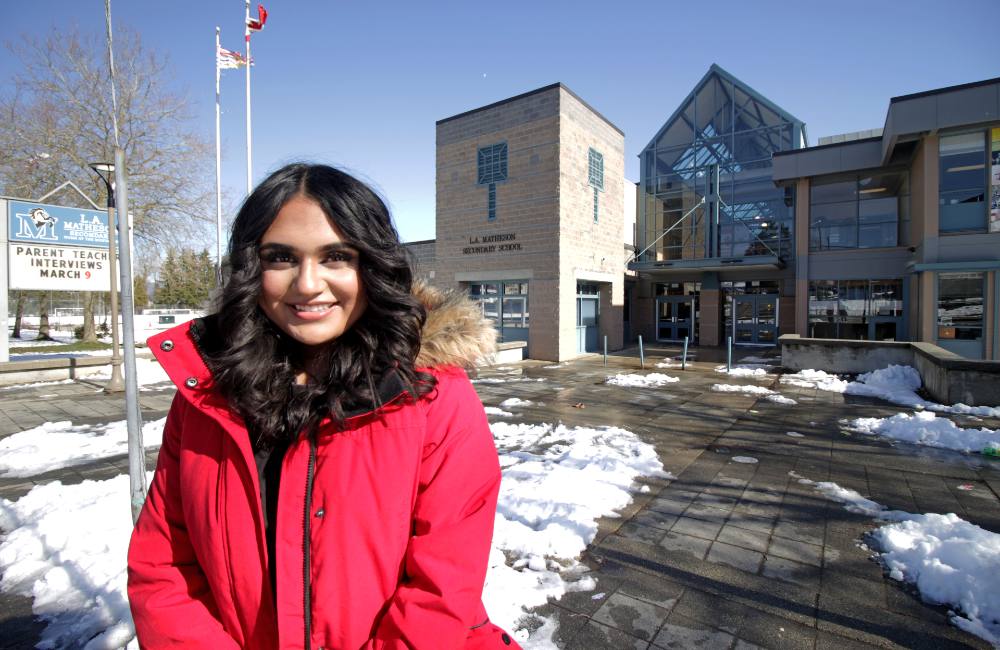
Gurveen Mann, a 17-year old at L.A. Matheson Secondary, says she isn’t opposed to the Surrey RCMP, despite having had a negative interaction.
“It was with a white, male RCMP officer and the tone used was just really disrespectful,” said Mann, explaining the incident happened with her and her Sikh immigrant parents. “Obviously, they were having problems speaking English and there was just no patience and training — just being understanding of the person,” she explained. “It wasn’t just being impatient. It was just using a harsh, hard tone.”
She added, “There’s also been times where I’ve interacted with RCMP officers and it’s been a positive experience. They’ve waited patiently. They talked to me and my mom and took it step by step. It wasn’t just rushing quickly.”
But while she has seen there can be a “lack of connection” between police and the community, Mann said if the SPS becomes the force for Surrey, she doesn’t “want it to end up creating more problems and just having it be another knock-off of the RCMP.”
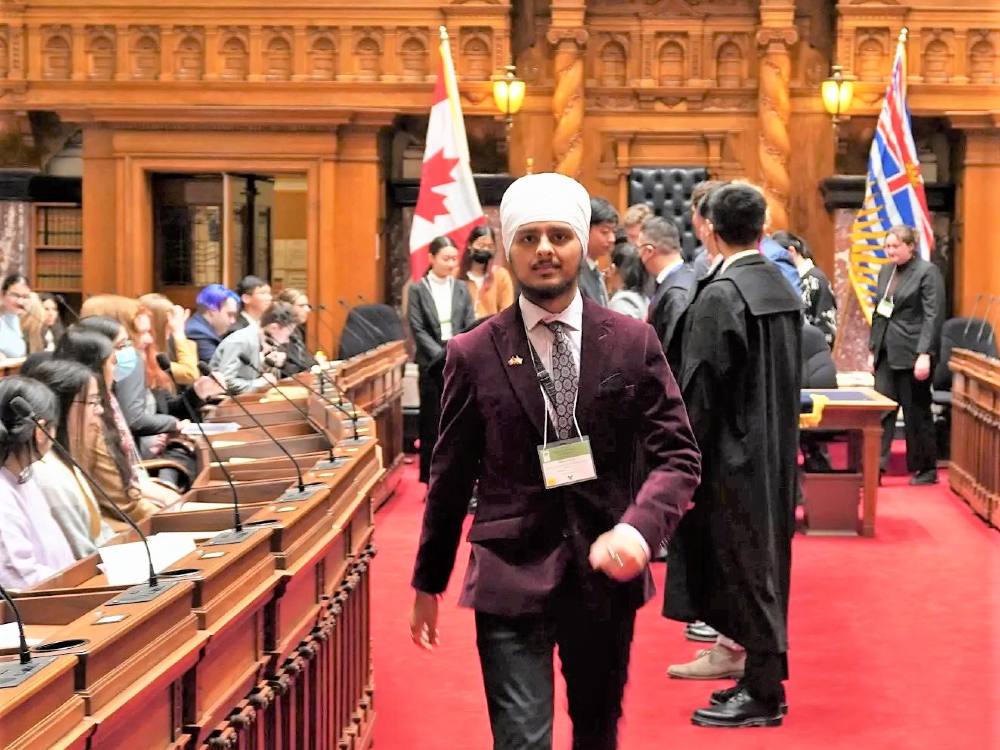
A large percentage of Surrey’s population of more than 600,000 are young people. The public school system has more than 70,000 students.
Even for some teens, big costs potentially attached to reviving the SPS are attention-getting. Mohkam Singh Malik, a 17-year-old student at Johnston Heights Secondary School, wanted to attend the March 6 Surrey council meeting where a then-proposed 17.5 per cent property tax increase tied to a shift to SPS would be discussed.
Beyond dollars and cents, Malik said he has further incentive to pay attention to “just policing in general, being a person of colour.”
As tensions rose in anticipation of the council vote, Malik was eager to attend. But he was unhappy to find out the meeting was at 2 p.m. on a Monday.
“And then that's, of course, why we have such low voter turnout rates in civic elections,” said Malik, who attended anyway. “That really motivated me to go speak there because I was, like, well, if it's 2 p.m. on a Monday, clearly they don't want people to come, so then I definitely should go and have my voice heard.”
Council ended up instructing staff to “work on reducing the overall proposed property tax increase from 17.5 per cent to no more than 12.5 per cent” given that the B.C. government had announced $89.9 million for Surrey through the provincial Growing Communities Fund.
Malik, who chairs Surrey’s Teen Library Council and belongs to the BC Youth Parliament, says he’s now more motivated to follow local government, “but they try to make it as hard as possible” and he worries some peers may feel they “are completely shut out of the process.”
While Malik hasn’t yet been able to vote in an election, he sees the effects these decisions will have on people his age. “A lot of my peers in my classes are recent immigrants or refugees. I know other classmates who, when I told them there's going to be a 17.5 per cent property tax increase, they're like, well, I don't know if my family can afford that.”
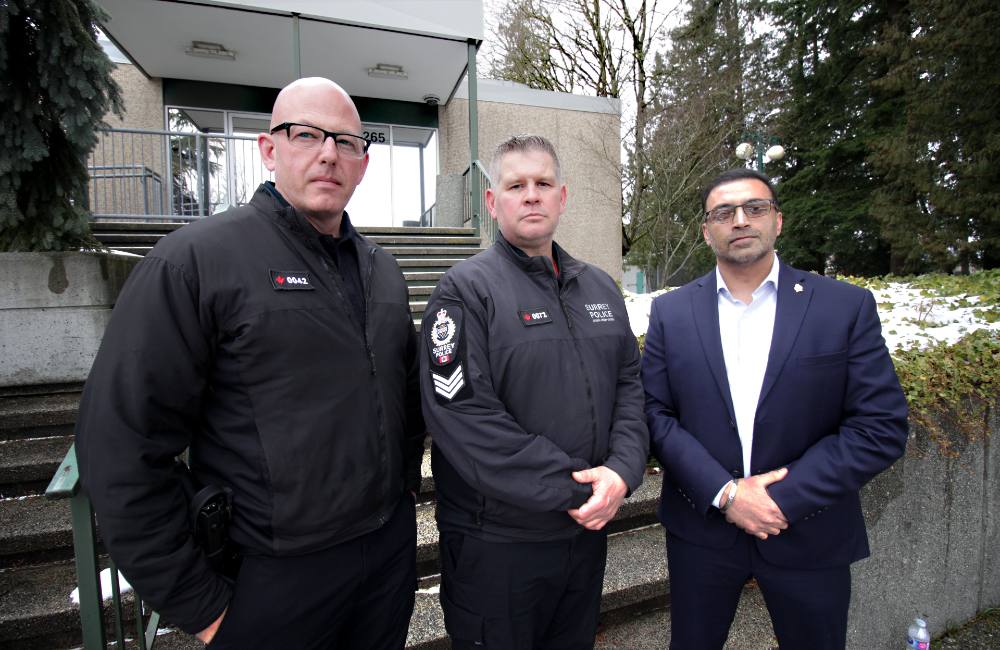
Currently, the Surrey Police Service is working alongside the Surrey RCMP, which are still the police of jurisdiction. The SPS has a total of 397 employees, of which 65 are civilian employees and 332 are sworn police members, with 205 of those already deployed with the RCMP.
Sgt. Jag Khosa spent 14 years in the gang scene working with the Combined Forces Special Enforcement Unit BC. For him, coming to a newly forming police force was one of the main attractions.
“When your car is running 100 miles an hour, sometimes it’s super hard to change direction immediately,” he said. “We have the luxury of time and we’re building this organization. I think we have a great opportunity to change things around.”
That opportunity, he said, is “huge in terms of bringing the much-needed change.” But he notes accountability also needs to be there.
Sgt. Mike Grandia, who works in the youth unit, has been an officer for 18 years, much of that time in roles with youth and the Tsawwassen First Nation.
Grandia said he knew the current models of policing that were being utilized “weren’t really meeting the needs of the community.”
He welcomes discussions about “re-tasking folks and what their positions look like, so the policing positions look different.”
“Enforcement is one aspect of what we do, and in my opinion, is a very small aspect of what we do or should be doing.”
He noted the goal is to make sure the community is safe, but there needs to be a focus on justice reform, which works in tandem with police reform.
“If you have all these justice systems and structures doing all this great work, they become trauma-informed. They're doing all this amazing stuff. They're coming up with alternatives, but if you have the police that aren't utilizing the systems and structures, you are never going to have justice reform because the police won't work in that system. We have to all work together around justice reform and police reform is at the start of it.”
Sayers was in Vancouver earlier this month for the BC First Nations Justice Council Justice Forum, where Indigenous perspectives on policing where shared.
“We’re using a very colonized system, a system that we were never a part of,” she explained. “With the RCMP, of course, one of the major problems that we have is that it was the RCMP officers that came and took our children when they didn’t go to residential schools.
“People look at them in that fashion, or they look at them in light of any of the murders or terrible things that have happened. There’s a lot of history there, so in that way the Surrey Police might be better.”
But she also noted there have been issues with municipal forces, pointing to the killing of Chantel Moore by a police officer in Edmunston, New Brunswick during a wellness check in 2020. Moore, 26, was Tla-o-qui-aht/Nuu-chah-nulth.
“There was a lack of policy on Tasers and de-escalation that we found out about” only after the fact through a coroner’s inquest, Sayers explained.
“How comprehensive are the policies going to be in a new police force because they’re starting from scratch?” she asks. “What are those policies, how are they going to formulate those policies in carrying out policing?”
Staff Sgt. Clayton Ennis is in charge of the SPS’s operational skills unit and he said the force has a focus on de-escalation.
“Introducing yourself and telling them that you’re there to help, that helps bring the scenario down,” he says. “I always say if you can get those two things out, that helps you slow down and not escalate this to a point of no return.”
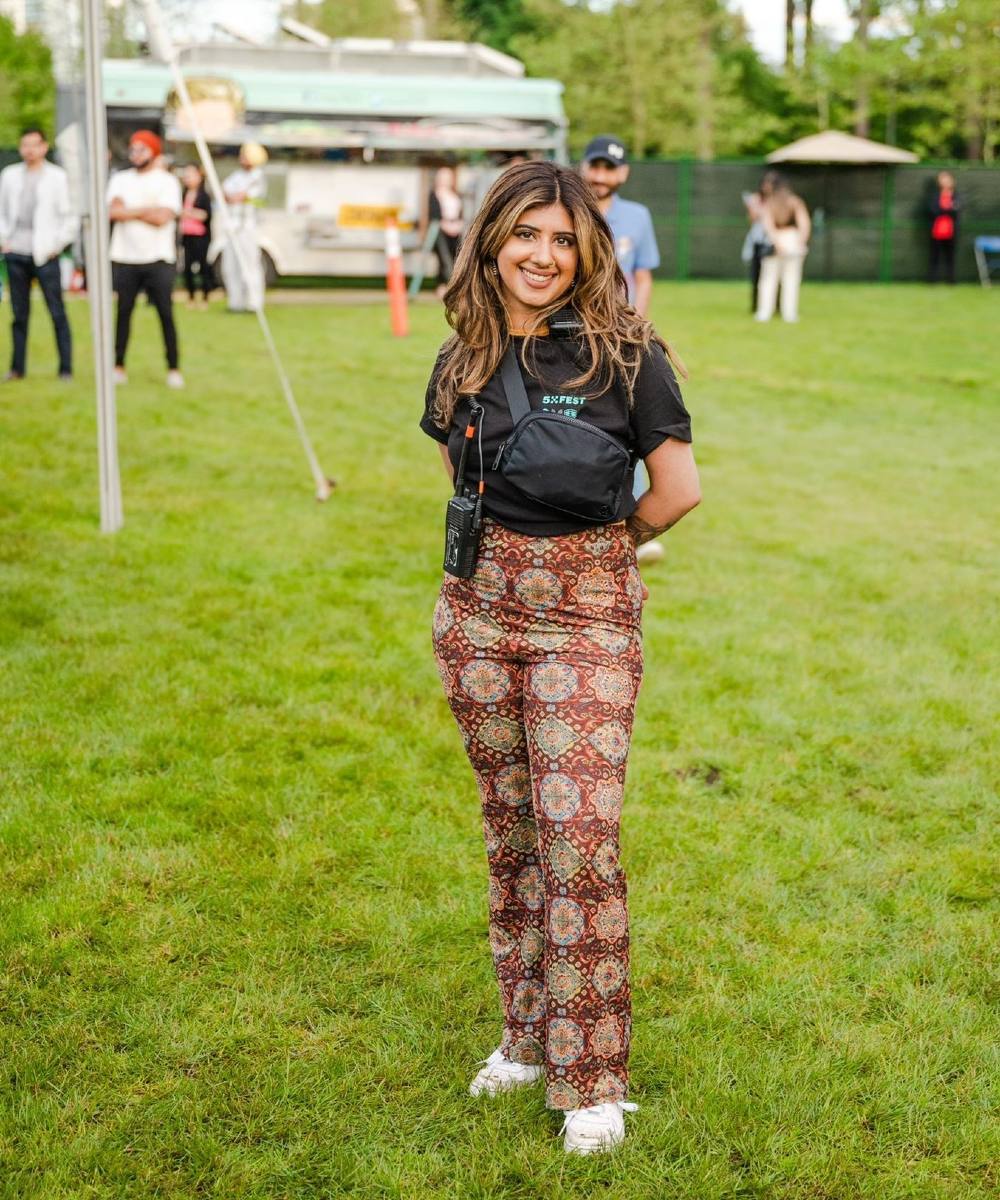
After Mander posted on social media for 5X, Surrey Police Service reached out to her group and others for an informal roundtable to discuss the SPS’s vision and mandate.
Mander said she was “really pleased to see the level of introspection that these folks have done when it comes to the way that their community feels about the policing situation.”
While there are “some really progressive ideas being floated” with the SPS, Mander is curious to see the implementation if the province does go with the SPS. She adds 5X and other groups are also open to the Surrey RCMP doing something similar.
“We haven’t seen that yet.”
The Surrey RCMP, which declined an interview, began patrolling in Surrey on May 1, 1951 following a switch from a municipal force.
In that time, Surrey RCMP has offered several programs for youth and the community, including the: Surrey RCMP Basketball Classic, a high school tournament involving hundreds of students from the city, which is the largest RCMP-sponsored tournament in the country; and Project Lavender, a program which aims to empower youth to make positive choices and understand the importance of engaging in healthy relationships.
Another initiative is the Surrey Wrap program, a partnership between the Surrey school district, the City of Surrey and Surrey RCMP, a support program for students who exhibit signs of gang associated behaviour.
Red Fox Healthy Living Society is a Vancouver-based youth organization promoting healthy active living for Indigenous youth, racialized and newcomer youth, youth living on low incomes, and youth with disabilities.
Since about 2015, Red Fox has been doing some of that work in Surrey, working closely with the Wrap program, explained Emma Sutherland, the executive director and founder.
She said some of the Red Fox team and their youth have had negative experiences with police, but adds the Wrap program “has really helped some of our youth and team members see the police in a different light, and I think that’s been beneficial.”
But there also could have been a benefit to involving youth in the decisions around the policing transition, Sutherland notes.
“I would be interested to see: Do youth have different perceptions of the RCMP from more local police forces? And is the youth experience of the RCMP different in Surrey than it would be, say, I don't know in Richmond, or a small town?”
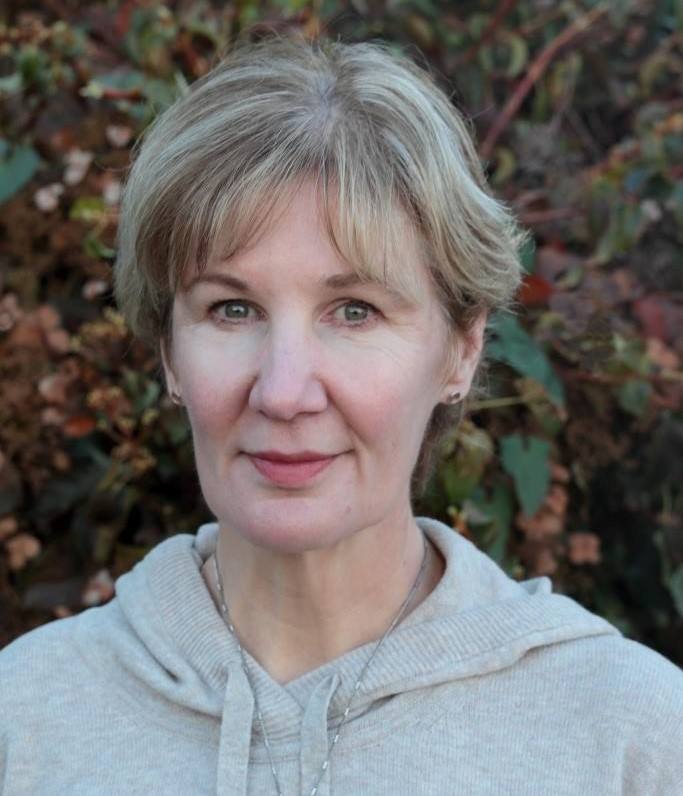
Surrey Mayor Locke, who campaigned in the 2022 election to revert back to Surrey RCMP, says the “public was not consulted properly at all” before the SPS was ushered in.
“We have never had a proper dialogue on this. We have never had truthful information presented to the public. In the meantime, the whole thing has been fast-tracked and rushed because of the wishes of the previous council that lost its way.”
It’s worth noting that Locke was in McCallum’s Safe Surrey Coalition majority when they voted unanimously to end the city’s contract with the Surrey RCMP at the council’s swearing-in ceremony on Nov. 5, 2018. She ended up creating the Surrey Connect slate with former Surrey councillor Jack Hundial in early 2020.
But Locke said if the Surrey RCMP remains the police of jurisdiction, “it will not be business as usual,” adding “we will definitely see governance changes within the model.” Locke wants to see a police board, “similar to what they have with municipal police forces,” with locally appointed members who will provide some recommendations to the police.
“At the end of the day, it's going to be relying on this community board that's going to start to give insight into what we want to see with policing.”
Surrey RCMP, she said, is the “gold standard,” with “some of the best urban policing, I would say, in the Lower Mainland.”
Asked what the plan is if the province does choose to continue with a municipal force, she says “no is not an option.”
Locke said she’s seen “poll after poll after poll” indicating residents want to remain with the Surrey RCMP.
But Mander senses fear to speak in public about the choice and what it should mean.
“I have to be straight up. People are really afraid to get involved. I have to be careful as well. People have to be careful. You go around town and you’re like, ‘Are you this side or that side?’
“I think people are just so afraid to even have an opinion or voice an opinion. I think when you’re fearful, you’re quiet and you don’t participate.
“Because we’re so polarized between whether you have to be RCMP or SPS, I think the actual impacts that policing will have on young people are just being bypassed.” ![]()
Read more: Rights + Justice, Labour + Industry




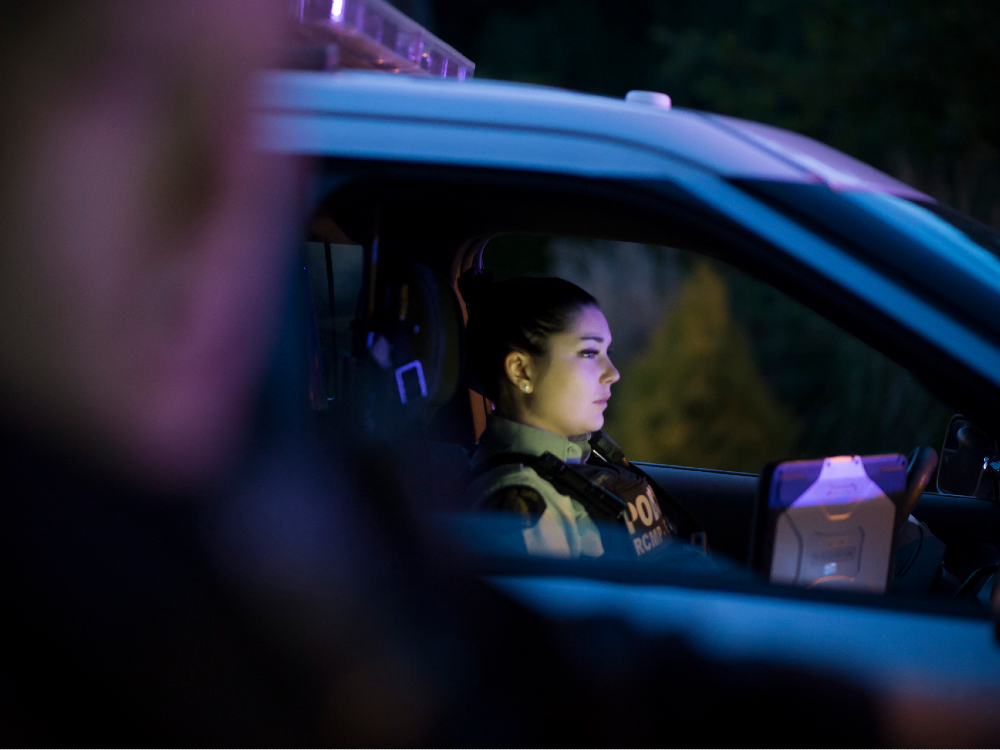












Tyee Commenting Guidelines
Comments that violate guidelines risk being deleted, and violations may result in a temporary or permanent user ban. Maintain the spirit of good conversation to stay in the discussion and be patient with moderators. Comments are reviewed regularly but not in real time.
Do:
Do not: